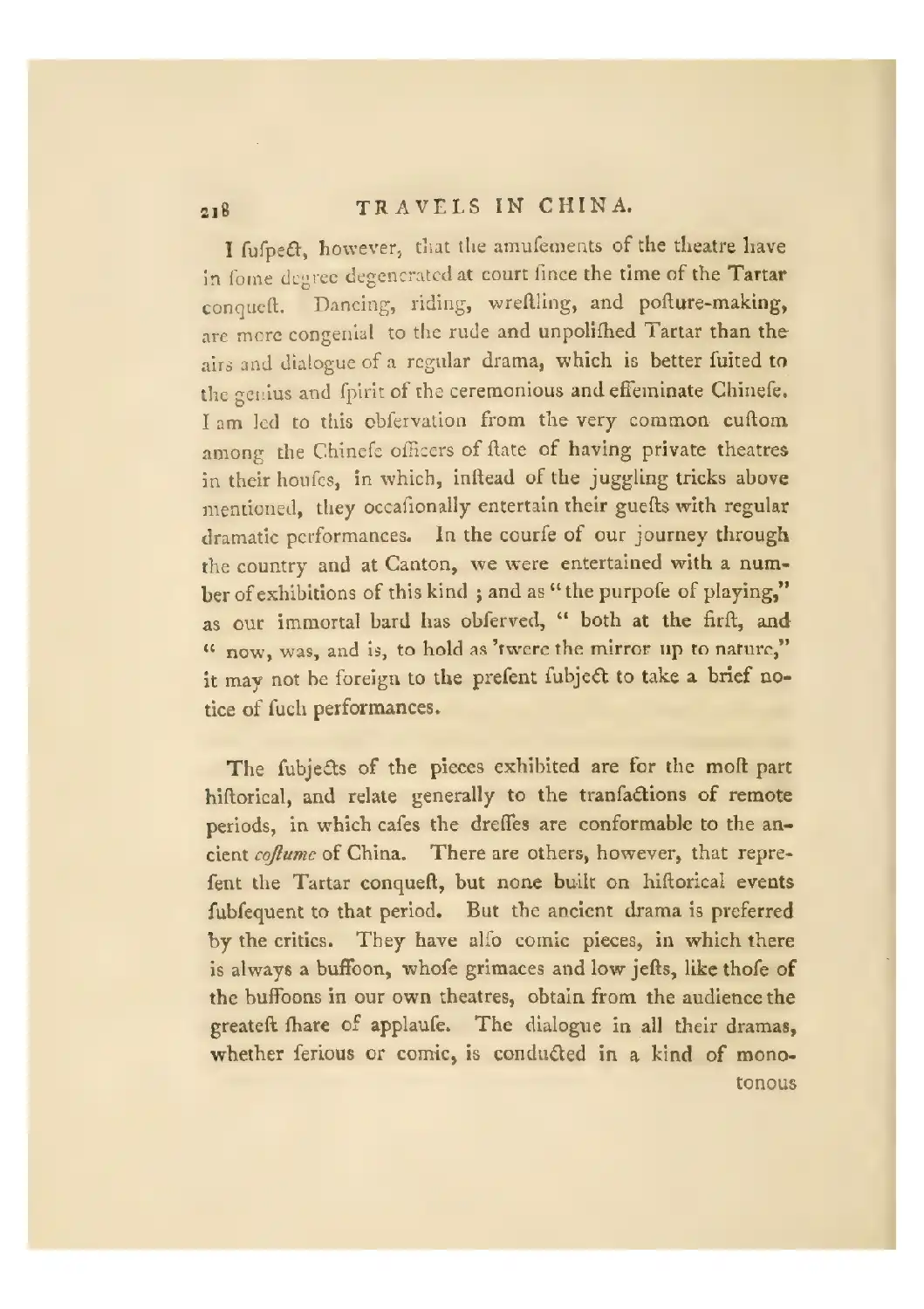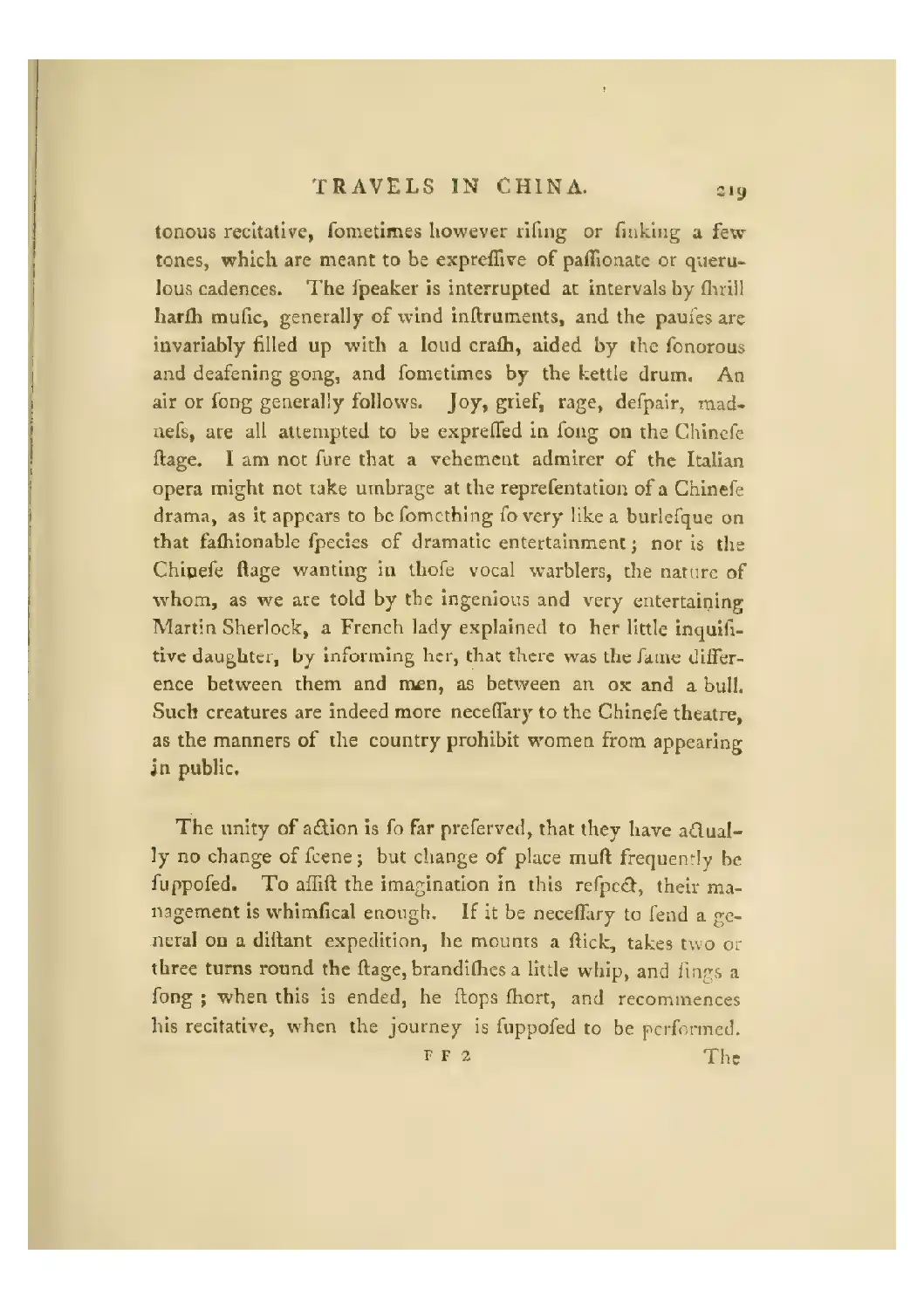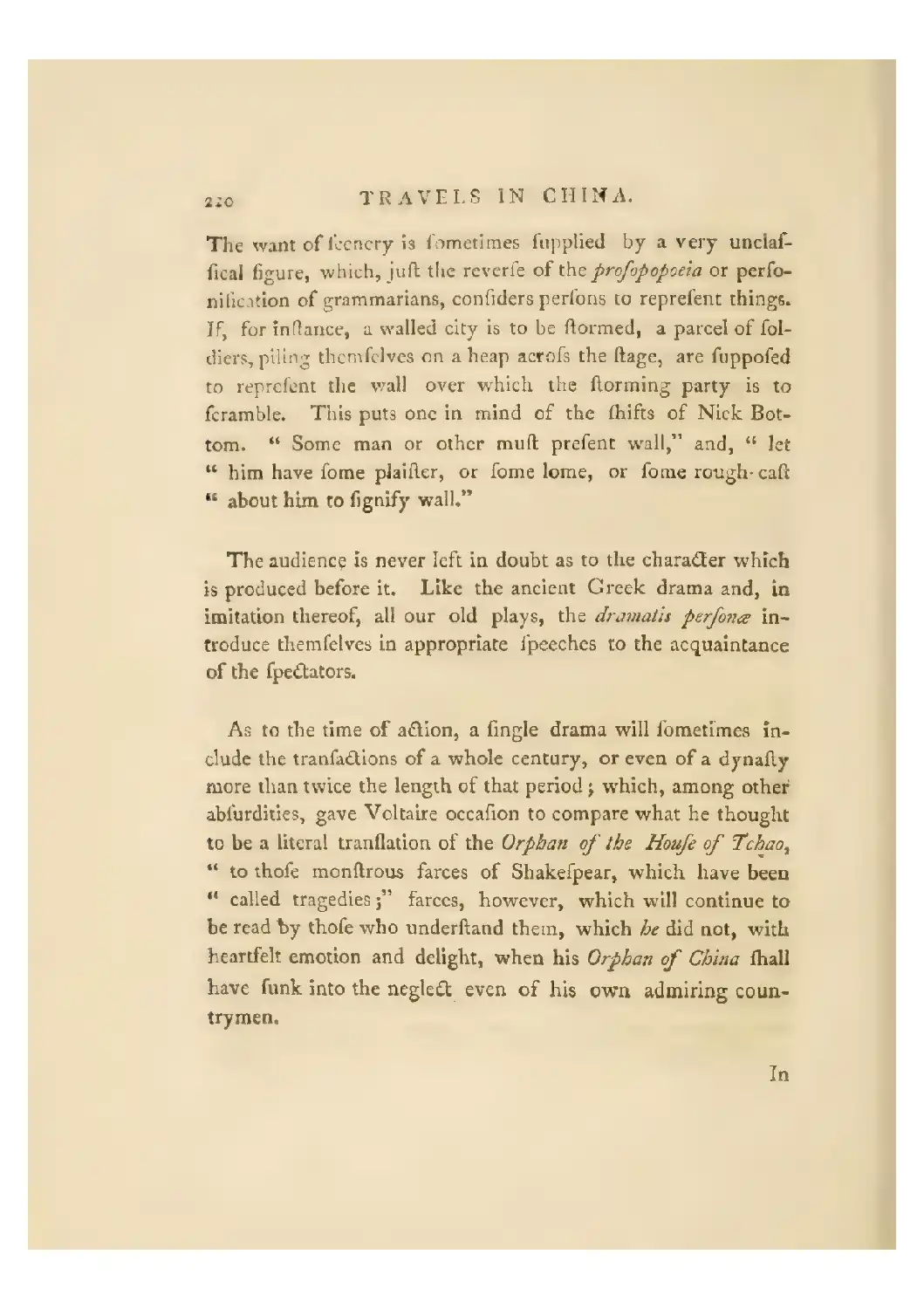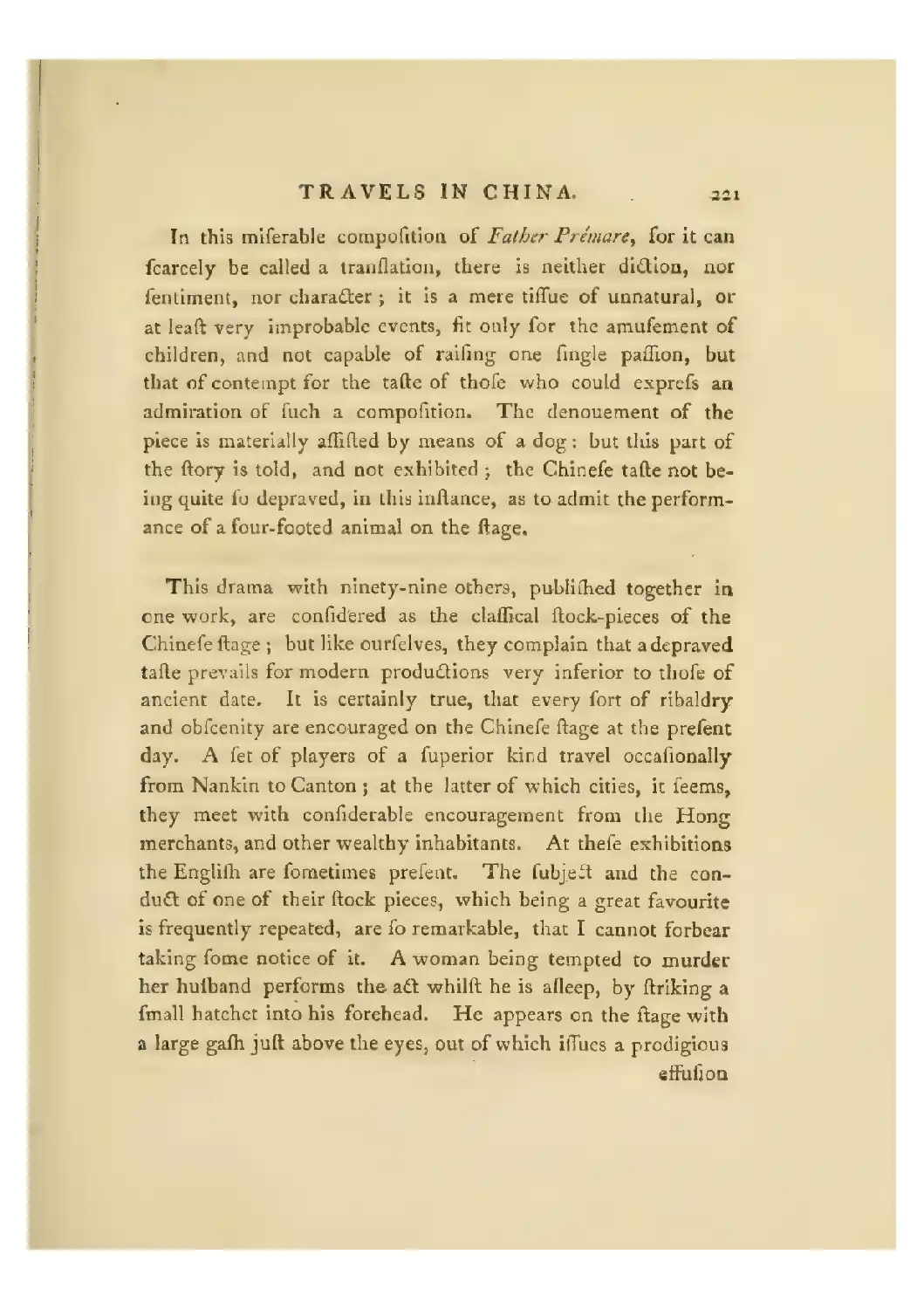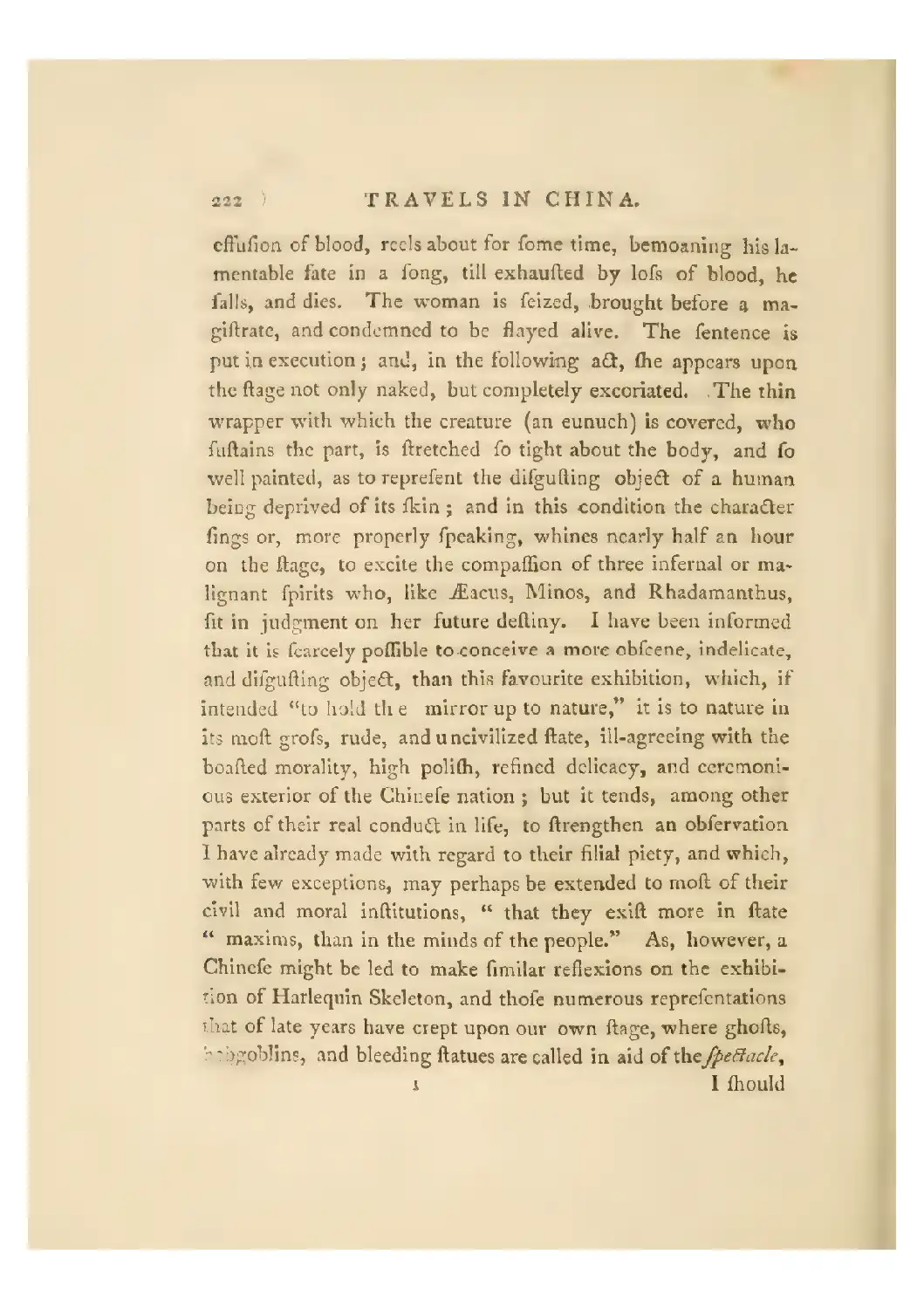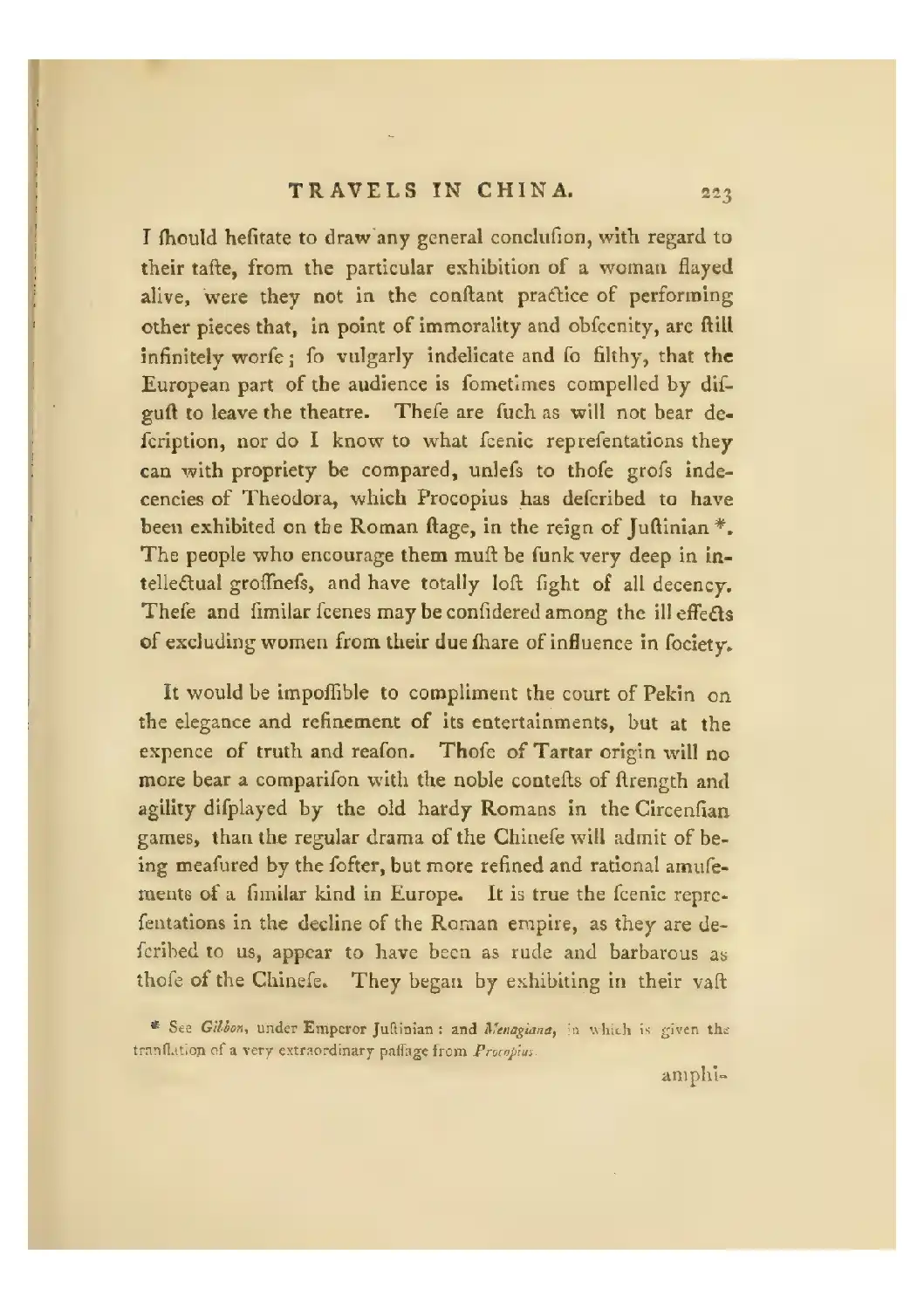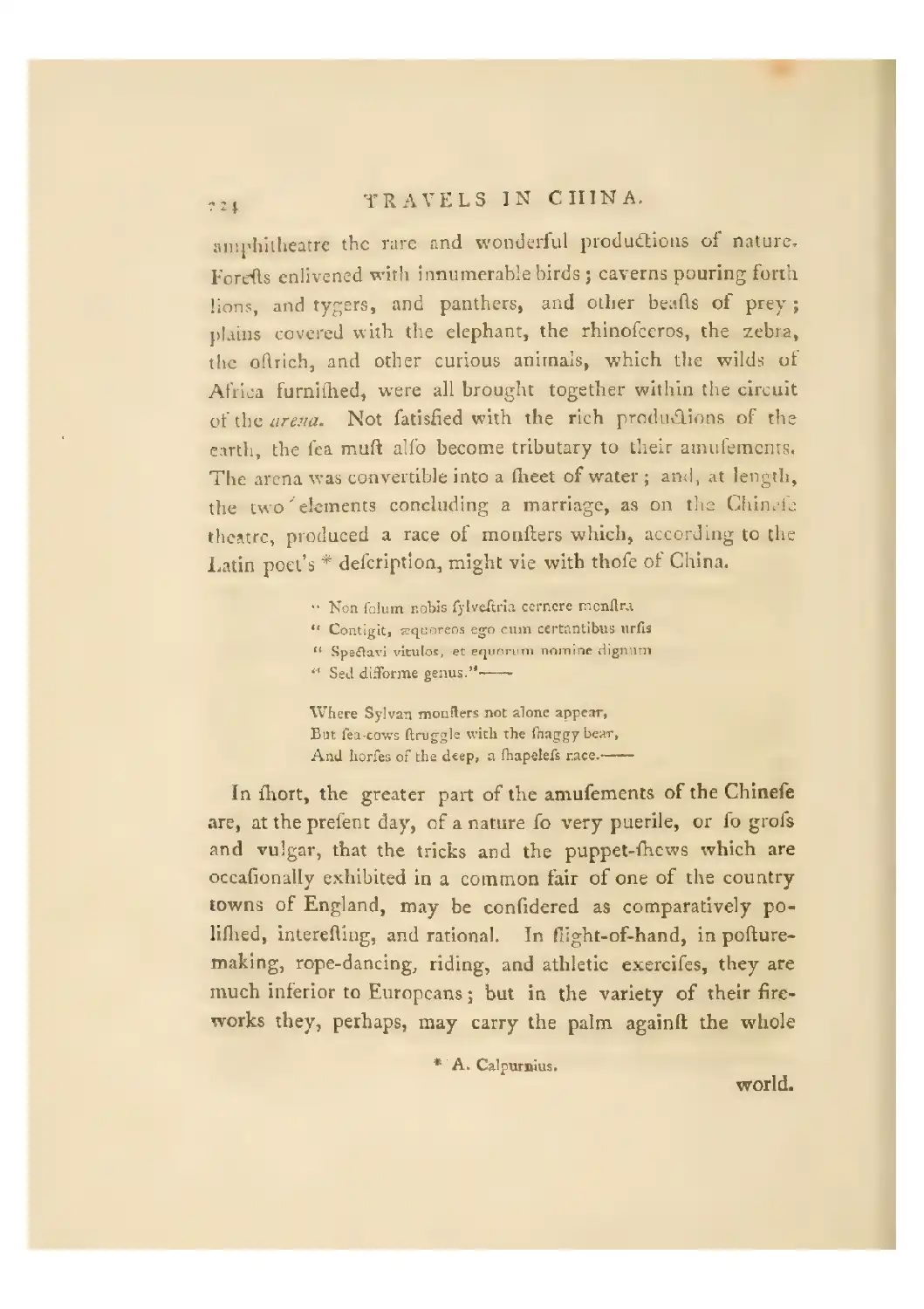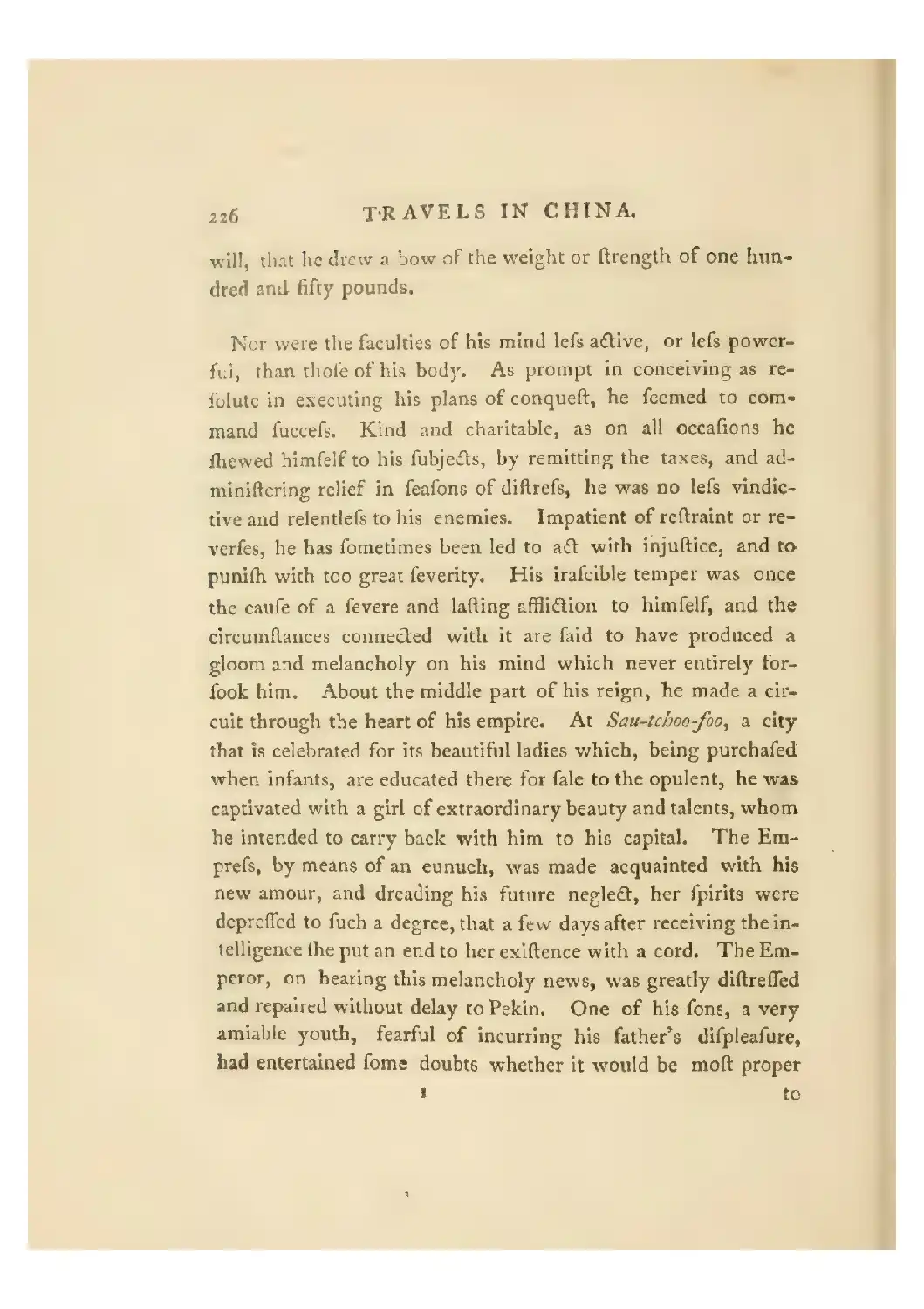Travels in China
- Info
- Pages
- Transcript
- Related
p. 218
I suspect, however, that the amusements of the theatre have in some
degree degenerated at court since the time of the Tartar conquest.
Dancing, riding, wrestling, and posture-making are more congenial to the
rude and unpolished Tartar than the airs and dialogue of a regular
drama, which is better suited to the genius and spirit of the
ceremonious and effeminate Chinese. I am led to this observation from
the very common custom among the Chinese officers of state of having
private theatres in their houses, in which, instead of the juggling
tricks above mentioned, they occasionally entertain their guests with
regular dramatic performances. In the course of our journey through the
country and at Canton, we were entertained with a number of exhibitions
of this kind; and as “the purpose of playing,” as our immortal bard has
observed, “both at the first, and now, was, and is, to hold as ‘twere
the mirror up to nature,” it may not be foreign to the present subject
to take a brief notice of such performances.
The subjects of the pieces exhibited are for the most part historical,
and relate generally to the transactions of remote periods, in which
cases the dresses are conformable to the ancient costume of China. There
are others, however, that represent the Tartar conquest, but none built
on historical events subsequent to that period. But the ancient drama is
preferred by the critics. They have also comic pieces, in which there is
always a buffoon, whose grimaces and low jests, like those of the
buffoons in our own theatres, obtain from the audience the greatest
share of applause. The dialogue in all their dramas, whether serious or
comic, is conducted in a kind of monotonous
p. 219
recitative, sometimes however rising or sinking a few tones, which are
meant to be expressive of passionate or querulous cadences. The speaker
is interrupted at intervals by shrill harsh music, generally of wind
instruments, and the pauses are invariably filled up with a loud crash,
aided by the sonorous and deafening gong, and sometimes by the kettle
drum. An air or song generally follows. Joy, grief, rage, despair,
madness, are all attempted to be expressed in song on the Chinese stage.
I am not sure that a vehement admirer of the Italian opera might not
take umbrage at the representation of a Chinese drama, as it appears to
be something so very like a burlesque on that fashionable species of
dramatic entertainment; nor is the Chinese stage wanting in those vocal
warblers, the nature of whom, as we are told by the ingenious and very
entertaining Martin Sherlock, a French lady explained to her little
inquisitive daughter, by informing her, that there was the same
difference between them and men, as between an ox and a bull. Such
creatures are indeed more necessary to the Chinese theatre, as the
manners of the country prohibit women from appearing in public.
The unity of action is so far preserved, that they have actually no
change of scene; but change of place must frequently be supposed. To
assist the imagination in this respect, their management is whimsical
enough. If it be necessary to fend a general on a distant expedition, he
mounts a stick, takes two or three turns round the stage, brandishes a
little whip, and sings a song; when this is ended, he stops short, and
recommences his recitative, when the journey is supposed to be
performed.
p. 220
The want of scenery is sometimes supplied by a very unclassical figure,
which, just the reverse of the prosopopoeia or personification of
grammarians, considers persons to represent things. If, for instance, a
walled city is to be stormed, a parcel of soldiers, piling themselves on
a heap across the stage, are supposed to represent the wall over which
the storming party is to scramble. This puts one in mind of the shifts
of Nick Bottom. “Some man or other must present wall,” and “let him have
some plaister, or some lome, or some rough cast about him to signify
wall."
The audience is never left in doubt as to the character which is
produced before it. Like the ancient Greek drama and, in imitation
thereof, all our old plays, the dramatis personae introduce themselves
in appropriate speeches to the acquaintance of the spectators.
As to the time of action, a single drama will sometimes include the
transactions of a whole century, or even of a dynasty more than twice
the length of that period; which, among other absurdities, gave Voltaire
occasion to compare what he thought to be a literal translation of the
Orphan of the House of Tchao to those monstrous farces of Shakespear,
which have been called tragedies; farces, however, which will continue
to be read by those who understand them, which he did not, with
heartfelt emotion and delight, when his Orphan of China shall have sunk
into the neglect even of his own admiring countrymen.
p. 221
In this miserable composition of Father Prémare, for it can scarcely be
called a translation, there is neither diction, nor sentiment, nor
character; it is a mere tissue of unnatural, or at least very improbable
events, fit only for the amusement of children, and not capable of
raising one single passion, but that of contempt for the taste of those
who could express an admiration of such a composition. The denouement of
the piece is materially affected by means of a dog: but this part of the
story is told, and not exhibited; the Chinese taste not being quite so
depraved, in this instance, as to admit the performance of a four-footed
animal on the stage.
This drama with ninety-nine others, published together in one work, are
considered as the classical stock-pieces of the Chinese stage; but like
ourselves, they complain that a depraved taste prevails for modern
productions very inferior to those of ancient date. It is certainly
true, that every sort of ribaldry and obscenity are encouraged on the
Chinese stage at the present day. A set of players of a superior kind
travel occasionally from Nankin to Canton; at the latter of which
cities, it seems, they meet with considerable encouragement from the
Hong merchants, and other wealthy inhabitants. At these exhibitions the
English are sometimes present. The subject and the conduct of one of
their stock pieces, which being a great favourite is frequently
repeated, are so remarkable, that I cannot forbear taking some notice of
it. A woman being tempted to murder her husband performs the act whilst
he is asleep, by striking a small hatchet into his forehead. He appears
on the stage with a large gash just above the eyes, out of which issues
a prodigious
p. 222
effusion of blood, reels about for some time, bemoaning his lamentable
fate in a song, till exhausted by loss of blood, he falls, and dies. The
woman is seized, brought before a magistrate, and condemned to be flayed
alive. The sentence is put in execution; and, in the following act, she
appears upon the stage not only naked, but completely excoriated. The
thin wrapper with which the creature (an eunuch) is covered, who
sustains the part, is stretched so tight about the body, and so well
painted, as to represent the disgusting object of a human being deprived
of its skin; and in this condition the character sings or, more properly
speaking, whines nearly half an hour on the stage, to excite the
compassion of three infernal or malignant spirits who, like Aeacus,
Minos, and Rhadamanthus, sit in judgment on her future destiny. I have
been informed that it is scarcely possible to conceive a more obscene,
indelicate, and disgusting object, than this favourite exhibition,
which, if intended “to hold the mirror up to nature,” it is to nature in
its most gross, rude, and uncivilized state, ill-agreeing with the
boasted morality, high polish, refined delicacy, and ceremonious
exterior of the Chinese nation; but it tends, among other parts of their
real conduct in life, to strengthen an observation I have already made
with regard to their filial piety, and which, with few exceptions, may
perhaps be extended to most of their civil and moral institutions, “that
they exist more in state maxims, than in the minds of the people.” As,
however, a Chinese might be led to make similar reflexions on the
exhibition of Harlequin Skeleton, and those numerous representations
that of late years have crept upon our own stage, where ghosts,
hobgoblins, and bleeding statues are called in aid of the spectacle,
p. 223
I should hesitate to draw any general conclusion, with regard to their
taste, from the particular exhibition of a woman flayed alive, were they
not in the constant practice of performing other pieces that, in point
of immorality and obscenity, are still infinitely worse; so vulgarly
indelicate and so filthy, that the European part of the audience is
sometimes compelled by disgust to leave the theatre. These are such as
will not bear description, nor do I know to what scenic representations
they can with propriety be compared, unless to those gross indecencies
of Theodora, which Procopius has described to have been exhibited on the
Roman stage, in the reign of Justinian.* The people who encourage them
must be sunk very deep in intellectual grossness, and have totally lost
sight of all decency. These and similar scenes may be considered among
the ill effects of excluding women from their due share of influence in
society.
It would be impossible to compliment the court of Pekin on the elegance
and refinement of its entertainments, but at the expense of truth and
reason. Those of Tartar origin will no longer bear a comparison with the
noble contests of strength and agility displayed by the old hardy Romans
in the Circassian games, than the regular drama of the Chinese will
admit of being measured by the softer, but more refined and rational
amusements of a similar kind in Europe. It is true the scenic
representations in the decline of the Roman empire, as they are
described to us, appear to have been as rude and barbarous as those of
the Chinese. They began by exhibiting in their vast
* See Gibbon, under Emperor Justinian: and Menagiana, in which is given
this translation of a very extraordinary passage from Procopius.
p. 224
amphitheatre the rare and wonderful productions of nature; forests
enlivened with innumerable birds; caverns pouring forth lions, and
tygers, and panthers, and other beads of prey; plains covered with the
elephant, the rhinoceros, the zebra, the ostrich, and other curious
animals, which the wilds of Africa furnished, were all brought together
within the circuit of the arena. Not satisfied with the rich productions
of the earth, the sea must also become tributary to their amusements.
The arena was convertible into a sheet of water; and, at length, the two
‘‘elements concluding a marriage, as on the Chinese theatre, produced a
race of monsters which, according to the Latin poet’s * description,
might vie with those of China.
“Non solum nobis sylvestria cernere monstra
Contigit, aequoreos ego cum certantibus ursis
Spectavi vitulos, et equorum nomine dignum
Sed difforme genus."
Where Sylvan monsters not alone appear,
But sea-cows struggle with the shaggy bear,
And horses of the deep, a shapeless race.
In short, the greater part of the amusements of the Chinese are, at the
present day, of a nature so very puerile, or so gross and vulgar, that
the tricks and the puppet-shews which are occasionally exhibited in a
common fair of one of the country towns of England, may be considered as
comparatively polished, interesting, and rational. In slight-of-hand, in
posture- making, rope-dancing, riding, and athletic exercise, they are
much inferior to Europeans; but in the variety of their fireworks they,
perhaps, may carry the palm against the whole
* A. Calpurnius.
p. 225
world. In every other respect the amusements of the capital of China
appear to be of a low and trifling nature, neither suited to the
affected gravity of the government nor to the generally supposed state
of civilization among the people.
The old Emperor, as he observed to Lord Macartney, seldom partook of
such amusements. Considering, indeed, all the circumstances connected
with the reign of the present dynasty on the throne, the government of
an empire of such vast magnitude, stored with an almost incalculable
population, must necessarily be a task of inconceivable vigilance and
toil; a task that must have required all the time, the talents, and the
attention of the four sovereigns to ensure the brilliant and
unparalleled successes that have distinguished their long reign.
